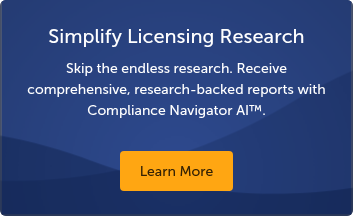
Medical Gas and Medical Device Retailer Licensing
Learn about registration requirements for retail distributors of medical gases and devices.
Overview of Licensing Requirements
In the vast majority of states, entities that sell medical gases or medical devices directly to consumers are required to obtain a license issued by the board of pharmacy or department of health. Some device distributors may even need to apply for more than one state-issued license. Pharmacies that distribute medical devices, for example, will likely need a pharmacy permit, medical device retailer license, and a controlled substance registration.
When applying for a state-level license, medical gas and device retailers may be asked for the following:
- Business entity information
- A list of officers and owners of the entity
- The types of medical products the facility will distribute
- Information about the manager in charge or compliance officer of the facility
- Copies of licenses held in home state for out-of-state entities
- An inspection of the business location
- Copies of related federal licenses the entity has
- A copy of the operating license/permit of the facility
- Articles of incorporation or certificate of authority for foreign entities
After meeting state-level registration and licensing requirements, entities that distribute, store, or manufacture controlled substances may also need to apply for a federal controlled substances registration with the Drug Enforcement Administration (DEA). Like most state-issued controlled substance registrations, entities with more than one facility will likely need to apply for separate DEA registrations for each location subject to the registration requirement.
In addition to licensing requirements, retailers who make sales to Medicaid or Medicare beneficiaries must complete an enrollment application to be eligible to bill those programs for the products or services provided. Medicaid provider enrollment is typically administered through state departments of health while Medicare provider enrollment is conducted federally through the U.S. Centers for Medicare and Medicaid Services (CMS).
Multi-State Licensure
Medical gas and device retailers that operate a facility in more than one state or that ship products across state lines are often subject to additional registration requirements. Expanding into a new state is multi-faceted process that usually involves several state agencies.
For many states, the first step in the process is to foreign qualify your business entity with the secretary of state. In some cases, foreign qualification is a prerequisite to licensure, and entities without a certificate of authority will not be able to start the application process.
After qualifying as a foreign entity, retailers can apply for the necessary licenses and permits through state board of pharmacy or other state licensing authorities. Most states require retailers to possess a medical gas and device retailer license as well as a controlled substance registration.
In addition to licensing requirements, facilities expanding services to additional states often incur a tax liability in those states. State departments of revenue commonly require entities to register for corporate income tax, and for entities with employees in the state, withholding and unemployment insurance taxes.
Maintaining Compliance
After the requisite licenses and registrations are obtained, medical gas and device retailers should turn their attention to maintaining them. Licenses that are not properly maintained can quickly slip into inactive status and may become revoked entirely if neglected.
Retailer licenses typically expire annually or biennially, although some states have triennial renewal periods for licenses. In order to maintain the good standing of your facility, a renewal application and fee must be submitted prior to the license’s renewal date. Controlled substance registrations also renew on a regular basis. Most state-issued registrations renew annually, while federal controlled substance act registrations renew triennially for pharmacies.
For entities with a presence in multiple states, the renewal process becomes even more involved. In many cases, multi-state entities must keep up with facility license renewals, controlled substance registration renewals, and secretary of state annual report requirements in each state where they are registered.
In addition to these structured renewal events, retailers must also notify the board of ownership, address, and other entity information changes as they occur. Requirements vary from state-to-state, but ad hoc changes like this must often be reported within 30 days of the change occurring.
Keeping up with each state’s requirements, tracking renewals, and submitting the applications on time are critical to avoiding penalties. Dedicated compliance services and software can help you keep track of varying jurisdiction requirements and relevant updates to state laws.
Explore Licensing by State
Click on a link below to view licensing information in your state.
Controlled Substance Registration - In addition to a pharmacy license, controlled substance registration registration is required in many states for pharmacies that distribute controlled substances.
NABP (National Association of Boards of Pharmacy) - Host a variety of programs and resources relating to pharmacist and pharmacy licensure and examination.
Pharmacist in Charge - A licensed pharmacist designated by a pharmacy to act as the party responsible for compliance with regulations.
VPP (Verified Pharmacy Program) - A program run by NABP that allows state boards to share information and more easily register out-of-state pharmacies.



